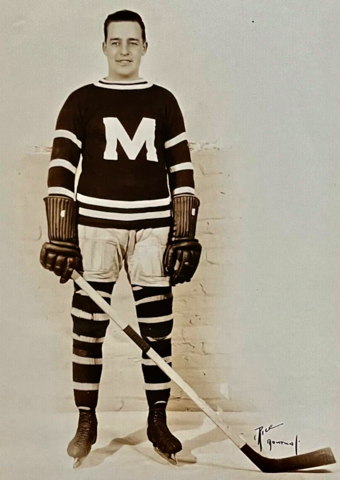IMAGE INFORMATION
EditRobert Nelson "Old Poison" Stewart - Born December 29, 1902 in Montreal, Quebec – Died August 21, 1957 in Wasaga Beach, Ontario was a Canadian ice Hockey centre, defenceman, coach and author.
After excelling in Hockey with the Parkdale Canoe Club in Toronto in 1919-20, Stewart embarked on a successful five-year tenure with the Cleveland Indians of the United States Amateur Hockey Association, leading the league in goals scored in four out of the five seasons he played before he and Babe Siebert were signed by the expansion Montreal Maroons of the NHL in 1925.
Stewart made his NHL debut on November 28, 1925 vs Ottawa Senators at Ottawa Auditorium in a 3-2 Ottawa win. Nels had 5 penalties in the game.
Stewart scored his 1st NHL goal vs Alphonse "Frenchy" Lacroix of the Montreal Canadiens at 15:40 of the 1st period on December 3, 1925 at Mount Royal Arena in a 3-2 Maroons win. Stewart also scored the game winner in the 3rd period and assisted on the other Maroons goal.
Nicknamed "Old Poison," and with Siebert and veteran stars Clint Benedict, Punch Broadbent and Reg Noble, he would lead the Maroons to the Stanley Cup championship in 1926. As a defenceman Stewart was able to score 6 of his team's 11 goals during their Finals matchup against the Victoria Cougars, including all four game-winning goals. Stewart himself led the league in goals (34), and point-scoring (42) that year, and become one of the few rookies in history to win the Hart Trophy as the NHL's Most Valuable Player.
Stewart perfected a hard-hitting style of play, with emphasis on collecting rebounds and scoring from bad angles around the crease.
His shot was fast and heavy, and noted to cause a more than a few injuries to the maskless goalies of the era, most notably Lorne Chabot in the 1928 playoffs, hitting his left eye, giving him a hemorrhage.
As a large, heavy centre who used his size and grit to complement his scoring touch, Stewart soon developed a ferocious reputation as both a fighter and an effective pest. He chewed tobacco constantly, and while hovering around the crease would spit the juice into opposing goaltenders’ eyes. Stewart would readily stand up for his teammates, and fought consistently as a result – he led the NHL in penalty minutes with 133 in 1927, edging out famed bruiser Eddie Shore by 3 minutes. He was equally infamous for using his stick to ward off opponents, liberally dishing out two-handed slashes across the wrists and ankles of those whom he felt were being too rough. This resulted in several famous bouts, including one with Hall of Fame defenceman and Maple Leafs strongman Red Horner.
In 1929-30, Stewart was teamed with Siebert and Hooley Smith to form the dreaded S Line. This formidable trio fused talent and physical play at a level rarely seen in NHL history. Stewart responded to this new assignment with a personal-best 39 goals in only 44 games. Stewart scored 134 times in just 5 seasons with the "S" line. He was presented with his second Hart Trophy and his reputation as one of the most effective pivots in league history was solidified. He starred for the Maroons for seven seasons in all.
In 1934 Stewart was selected to be one of the NHL All-Stars who faced off against the Toronto Maple Leafs in the historic Ace Bailey Benefit Game.
As the Great Depression deepened, though, the Maroons had increasing financial problems — eventually folding in 1938 — and sold Stewart to the Boston Bruins for cash. His glittering play continued for the Bruins, finishing second in team scoring each of his three full seasons with the team, despite being moved back to defence a fair bit.
The Battering Rams. That is what they call this Stewart-Barry-Clapper line. It is the heaviest forward line in professional Hockey. That line averages close to 200 pounds on the hoof. Clapper and Barry eventually refused to play with Stewart because he was too slow.
In 1935 he was traded to the New York Americans, for whom he played for most of his final five seasons in the league. In 1936 he surpassed Howie Morenz to become the all time leader in goals. Stewart starred through his penultimate season (in which he was fourth on the Amerks in scoring) with 35 points in 46 games at age 36. The season following, in 1939, his foot speed (never regarded as fast) deserted him entirely.
Stewart retired in 1940 with an NHL record 324 goals to his credit and his total stood as the league standard until Maurice Richard eclipsed it on November 8, 1952.
Stewart scored 324 goals and 191 assists in 653 league games. He was the first to score more than 300 goals in the NHL. He scored 15 goals, 13 assists in 54 NHL playoff games.
- Stanley Cup Champion 1926
- Won the Hart Trophy in 1926 and 1930
- Led the NHL in penalty minutes in 1927 with 133
- Played in the first NHL All-Star Game in 1934 - Ace Bailey Game
Holds the NHL record for fastest two goals (four seconds apart) set on January 3, 1931, against the Boston Bruins (matched by Deron Quint in December 1995)
For a number of years after his retirement he coached the Port Colborne Sailors of the Senior Ontario Hockey Association and St. Catharines.
In 1952 Nels published a book entitled “How to Watch and Enjoy Hockey”.
Nels Stewart was inducted in the Hockey Hall of Fame in 1962




